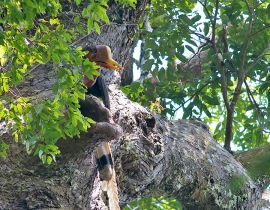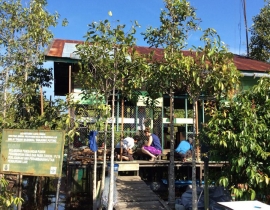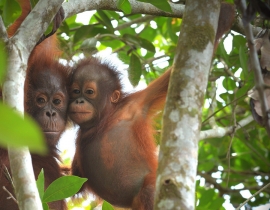Posted August 2, 2018 in All
Colchester Zoo’s Action for the Wild has supported the Hornbill Research Foundation since 2002, adopting families of hornbills in southern Thailand. Our adoption helps fund researchers from Bangkok’s Mahidol and Kasetsart Universities, along with 40 villagers, to look after hornbill nests found in natural tree cavities in a patch of tropical forest in Budo-Su-Ngai Padi National Park and to record hornbill biological data at all the nest sites as part of the team’s research to better understand the biology of the hornbills. In 2017, Action for the Wild continued its adoption of three hornbill families.
In 2017, 33 nests trees were available for the rhinoceros hornbills, with 6 sealed nests and 2 chicks successfully fledged in this year period. Our particular family, number 59, successfully fledged one of these chicks. Their nest was found in 2014, 12m above the ground. Over 2015-2017, three great hornbill chicks were fledged in this tree. In this year, the female rhinoceros hornbill entered the nest on the 9th March and the chick fledged from the nest on the 17th July. The guardian responsible for monitoring the nest spent an average of almost 6 hours a day observing the nest for 80 days. Throughout this period, the male fed at least 20 species of fruits, and spent about 15% of his time around the nest tree. The nest’s guardian has worked as a field assistant since 2007. He leads nature walks and is also a member of the nest maintenance team. In 2017, he looked after two rhinoceros hornbill nests and a bushy-crested hornbill nest.
In 2017, 8 nests trees were available for the helmeted hornbills, with 2 sealed nests and 2 chicks successfully fledged in this year period. Our particular family, number 22, successfully fledged one of these chicks. Their nest was found in 2016, 35m above the ground. The family have used this nest for two years starting in 2016, and fledged a chick in both 2016 and 2017. In this year, the female helmeted hornbill entered the nest on the 26th February and the chick fledged from the nest on the 19th June. The guardian responsible for monitoring the nest spent over 6.5 hours a day observing the nest for 55 days. Throughout this period, the male fed at least 16 species of fruits and one animal species; a leaf insect. The male spent about 18% of his time around the nest tree. The nest’s guardian, along with his adopted daughter, monitor the nest and he has worked as a field assistant since 1995. He leads nature walks and is one of the key leaders of the fixing team, being responsible for repairing, modifying natural nest cavities and installing artificial nests. In 2017, they looked after four nests, belonging to families of helmeted, rhinoceros, wreathed and white-crowned hornbills.
In 2017, 8 nests trees were available for the white-crowned hornbills, with 1 sealed nest and 2 chicks successfully fledged in this year period. Our particular family, number 12, successfully fledged both of these chicks. Their nest was found in 2017 and as yet, no data has been recorded on the tree. In this year, the female white-crowned hornbill entered the nest around mid May (she was already in the nest on the 22nd May) and the chicks fledged from the nest on the 4th September. The guardian responsible for monitoring the nest spent over 6.5 hours a day observing the nest for 44 days. Throughout this period, the male and helpers fed at least 13 species of fruits and 8 animal species; a snake, skink, flying lizard, leaf insect, walking stick, scorpion, centipede and millipede. The male and helpers spent about 23% of their time around the nest tree. The same nest guardian looked after this nest as the helmeted hornbill family number 22.
In 2017, various lectures took place; training researchers, students and youth on how to conduct hornbill research and conservation to enhance their knowledge and promote their awareness towards natural resource conservation. In total, 35 activities were conducted in 2017 to 2,399 participants.



